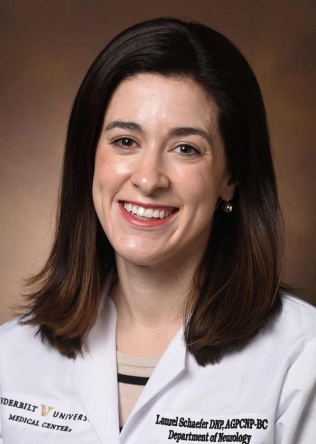Laurel Schaefer, DNP, APRN
Laurel is an ANCC Board Certified Adult-Gerontology Primary Care Nurse Practitioner who practices at the Vanderbilt University Medical Center Sleep Clinics in Franklin and Nashville. She was appointed to a faculty position at the Vanderbilt School of Medicine in 2016. She has a special interest in helping patients optimize their sleep and improve insomnia using behavioral and lifestyle interventions. She currently serves as the advanced practice team leader in outpatient neurology at VUMC. She lives in Franklin with her husband, John, and their two children Henry and Emma. She enjoys cooking, supporting her children in their athletic endeavors and staying active in her church.
She earned her undergraduate degree in neuroscience at Hamilton College in Clinton, New York in 2008. She also earned her Masters of Science in Nursing and Doctor of Nursing Practice from Vanderbilt University School of Nursing in 2013 and 2019 respectively and was invited to join the Signa Theta Tau Honor Society. She has been awarded the Excellence in Patient Experience Award at VUMC from 2021-2023 and serves as a clinical preceptor at the Vanderbilt University School of Nursing.
Shawniqua Williams Roberson, MEng, MD
Dr. Shawniqua Williams Roberson is an epileptologist and clinical neurophysiologist with dual appointments in the Departments of Neurology and Biomedical Engineering at Vanderbilt University. Her focus of work lies at the intersection of clinical neurophysiology, cognitive neuroscience, engineering and critical care. With advanced training in electrical engineering and computer science, Dr. Williams Roberson utilizes biophysical signal processing for the study and treatment of neurologic disease. Her clinical interests concentrate on the evaluation and management of refractory epilepsy, critical illness encephalopathy and related neurological disorders, with an emphasis on their cognitive and neuropsychiatric comorbidities.
Dr. Williams Roberson has served on a number of boards and committees throughout her career, currently serving on the American Academy of Neurology Guidelines and Meeting Management subcommittees, the editorial board of Neurology Today, the Professional Advisory Board of the Epilepsy Foundation of Middle and Eastern Tennessee and the VUMC Early Career Physician Council. She is a regularly invited presenter and lecturer in both academic and professional settings, and has served as a reviewer for such peer-reviewed publications as Chest, JAMA and Neurology, among several others. She is board certified in both Neurology and Epilepsy.
Dr. Williams Roberson completed her Bachelor of Science and Master of Engineering degrees at Massachusetts Institute of Technology. She later earned her MD with Honors in Research at Weill Cornell Medical College, during which she had the privilege of participating in the Consortium for the Advanced Study of Brain Injury under the guidance of Dr. Nicholas Schiff. Her primary research initiative involved the study of neurophysiologic signals underlying chronic disorders of consciousness. This work was funded through the Rockefeller University Center for Clinical and Translational Science (PI: Dr. Barry Coller). She subsequently pursued residency training at Johns Hopkins, where she worked with Dr. Barry Gordon investigating EEG signal properties of acute coma. She went on to complete a clinical neurophysiology fellowship with specialization in epilepsy at University of Pennsylvania, where, under the guidance of Dr. Brian Litt, she used high gamma activity measurements in intracranial electroencephalography to probe the neuronal activation patterns associated with verbal fluency, a common neurocognitive assessment task. Dr. Williams Roberson then pursued a postdoctoral translational research fellowship at the Center for Neuroengineering and Therapeutics at University of Pennsylvania, during which she undertook a number of projects, including a collaboration with other clinicians and engineering graduate students to develop a platform for automated, real-time ICU physiologic data monitoring, signal processing and caretaker notification.
Prior to her appointment at Vanderbilt, Dr. Williams Roberson worked as a Clinical Instructor at Pennsylvania Hospital, Penn Presbyterian Medical Center, and the Hospital of the University of Pennsylvania.
Dr. Williams Roberson’s research interests center around elucidating the neurophysiologic signal characteristics underlying consciousness and cognitive functions such as language production, perception and memory, and the use of these features to optimize the care of patients with central nervous system disorders such as delirium, dementia, epilepsy, and stroke. She applies computational and quantitative analysis techniques toward elucidating the neurophysiological basis of cognitive functions in health and in neurologically impaired states.
As a member of the Critical Illness, Brain Injury and Survivorship (CIBS) Center, Dr. Williams Roberson established a new pilot study recording 24-hour EEGs in patients on mechanical ventilation in Vanderbilt ICUs. The primary goal of the study is to evaluate the behavior of several quantitative measures of EEG complexity in the acute phase of critical illness, and their relationship to intermediate- and long-term cognitive outcomes. The results from this study will inform a larger observational study developing quantitative EEG-based biomarkers of ICU delirium and post-ICU cognitive impairment. She plans to use these biomarkers to identify patients most at risk for post-ICU dementia and subsequently develop and validate targeted neuromodulatory interventions to prevent or slow cognitive decline in this most vulnerable of populations.
Derek A. Riebau, MD
Dr. Derek Riebau is an Associate Professor of Neurology and Medical Director of the Stroke Program at Vanderbilt University Medical Center.
Dr. Riebau graduated with a BS from the University of Wisconsin – Eau Claire in 1997 and earned his MD from the University of Wisconsin Medical School at Madison in 2001. He completed his internship with the department of Medicine at Evanston Northwestern University in Evanston, IL. At Vanderbilt University, he completed his residency with the department of Neurology in 2005 and served as the Chief Resident of Neurology from 2004-2005. Subsequently, he completed a Vascular Neurology fellowship in 2007 and is currently on faculty in the Stroke division.
In addition to his clinical activities, Dr. Riebau has been heavily involved in education where his roles have included co-director of the Medical Neuroscience Course and director of the Neurology Clerkship in the Vanderbilt University School of Medicine, and co-director of the Neuroscience for Mental Health Practitioners Course in the Vanderbilt University School of Nursing. He has received numerous awards and honors for his teaching, including twice recipient of the Shovel Award given by the graduating medical school class to the faculty member they identify as having the most positive and meaningful influence on their education.
Nicole A. Poirier, MSN, FNP-BC
Nicole Poirier is an ANCC Board Certified Family Nurse Practitioner, specializing in Sleep Medicine. She was awarded faculty appointment to the VUMC School of Medicine’s Neurology department in January 2018 as an Advanced Practice Provider. She has been an active member of the American Academy of Sleep Medicine since 2019. She has taken special interest in assisting pediatric and adult patients optimize their treatment of sleep apnea through the CPAP Success Clinic. Nicole lives in South Williamson County with her husband, Jonathan, and their two children James and Ada Rose. She enjoys working out, cooking, gardening and being active in the outdoors with her family.
She began her career in healthcare as an RN in 2008 after earning her undergraduate degree in nursing at Memorial University, St. John's, Newfoundland, Canada. In May 2011 she was the recipient of the Award for Professional Nursing Clinical Excellence presented by Regional Cooperative for Professional Nurses. With eight years of experience as a registered nurse and a background in emergency nursing, Nicole earned her Master’s of Science in Nursing from Lincoln Memorial University Caylor School of Nursing in Knoxville, TN in 2016. She was invited to serve as a member of the Sigma Theta Tau Honor Society in 2015-2016.
Fenna T. Phibbs, MD, MPH
Dr. Fenna Phibbs is currently Associate Professor of Neurology at Vanderbilt University Medical Center (VUMC) specializing in movement disorders and deep brain stimulation (DBS). She focuses on DBS and its applications in various movement disorders such as Parkinson's disease, tremor, and dystonia.
Dr. Phibbs began her career at Vanderbilt in 2003 as a Neurology resident, and in 2007 she completed a fellowship in movement disorders with a focus on DBS. She joined the Neurology faculty as Assistant Professor, and completed her MPH thereafter. She graduated with a BS in biology from the Colorado State University in 1996. In 2002, Dr. Phibbs received her MD from the University of Colorado, where she also completed an internship year.
Dr. Phibbs’ research activities focus on the use of DBS in the treatment of movement disorders.
Amanda Peltier, MD
Dr. Amanda Peltier is a Professor of Neurology and Medicine at Vanderbilt University Medical Center where she serves as the Associate Vice Chair of Academic Affairs and Division Chief for the department’s Neuromuscular division. She holds certifications from the American Board of Psychiatry and Neurology (Neurology), the American Board of Electrodiagnostic Medicine, the American Board of Psychiatry and Neurology (Neuromuscular Medicine), and the United Council of Neurologic Subspecialties (Autonomic Disorders).
She is an active member, serving in several leadership capacities, of a number of professional organizations including the American Academy of Neurology, American Association of Neuromuscular and Electrodiagnostic Medicine, American Autonomic Society, American Diabetes Association, Peripheral Nerve Society, and American Neurology Association.
Dr. Peltier’s research, part of the Vanderbilt Autonomic Dysfunction Center, focuses on Peripheral Neuropathy, Diabetic Neuropathy, Amyloid Neuropathy, autonomic disorders, and identification of secondary endpoints for clinical trials in Neuropathy. Her work has been published in such journals as Neurology, Journal of Internal Medicine, American Journal of Medicine, Muscle and Nerve, among others. She is also the primary investigator for a skin biopsy biomarker trial in CIDP, and several trials in ALS and myasthenia gravis.
Dr. Peltier completed a Clinical EMG/Neuromuscular Disorders fellowship, as well as a Clinical Research fellowship at the University of Michigan, where she also completed her residency in Neurology. She earned her M.D. at Ohio State University, later earning an M.S. in Clinical Research Design and Statistical Analysis from the University of Michigan. She earned her B.A. in Classics and Biology from Denison University, where she graduated summa cum laude.
Siddharama Pawate, MBBS
Dr. Siddharama Pawate is currently Associate Professor of Neurology specializing in neuroimmunology at Vanderbilt University Medical Center. He is the director of the neuroimmunology fellowship program.
Dr. Pawate first came to VUMC in July 2006 as a clinical fellow in neuroimmunology, and joined the faculty in July 2009 as assistant professor in the Department of Neurology. He is a graduate of Karnatak Medical College, Hubli, India. He completed his internship at Coney Island Hospital in Brooklyn, NY in 2000 and his Neurology residency at the Medical University of South Carolina, Charleston, SC in 2006, where he was the chief resident in 2005-2006.
Dr. Pawate’s primary research focus has been high-field and quantitative magnetic resonance imaging to explore the pathology of multiple sclerosis, and to develop biomarkers for clinical progression and recovery in MS.
Dr. Pawate runs the Autoimmune Neurology Clinic, focused on immune-mediated diseases of the nervous system other than MS. Dr. Pawate has accumulated one of the largest collections in North America of less-common immune-mediated neurological disorders. He has published observations, providing new insights, of neurosarcoidosis, longitudinal myelitis, Hashimoto encephalopathy, Susacs syndrome, and hereditary leukodystrophy with axonal spheroids.
William P. Nobis, MD, PhD
Dr. Nobis is a board-certified epileptologist, licensed to practice medicine in Tennessee with certifications in Neurology and Epilepsy from the American Board of Psychiatry and Neurology. He joined Vanderbilt as a faculty member in the Epilepsy division in September 2018.
Dr. Nobis graduated with a B.S. in Biochemistry from Michigan State University in 2000 and then completed the Medical Scientist Training Program at Vanderbilt University in 2011 where he earned both his M.D. and a Ph.D. in Neuroscience. He did his internship and residency in Neurology at Northwestern University in Chicago, where he served as chief resident in 2015. He subsequently completed an Epilepsy fellowship at Northwestern in 2017.
Dr. Nobis' research focuses on sudden unexplained death in epilepsy (SUDEP), in particular electrophysiological and targeted functional anatomical evaluation of extended amygdala circuits relation to seizures and respiratory control. He hopes that a translational and basic science approach will be broadly applicable to sudden death via neurologic mechanisms such as SUDEP and SIDS and that these brain regions can be explored in terms of their potential role in comorbid depression and anxiety often seen in epilepsy patients.
For more information on Dr. Nobis’ research, visit his lab website.
Harold Moses, Jr, MD
Dr. Harold Moses is currently Associate Professor of Neurology, specializing in Neuroimmunology, at Vanderbilt University Medical Center.
In 1999 Dr. Moses joined the faculty at Vanderbilt University as assistant professor of Neurology, and in 2011, he became an associate professor.
Dr. Moses earned his undergraduate degree in Zoology from the University of North Carolina, graduating with honors in 1985. He received his medical degree from the University of North Carolina School of Medicine in 1993, and began his post-graduate training at the university as a medical intern in the Department of Internal Medicine. Dr. Moses then completed a residency at the Mayo Clinic in the Department of Neurology in 1997, and came to Vanderbilt University as a Neurology instructor/fellow.
Dr. Moses has been a part of a number of clinical trials for relapsing and progressive MS. He has a particular interest in progressive MS and is now examining cellular therapy for patients with progressive MS.









